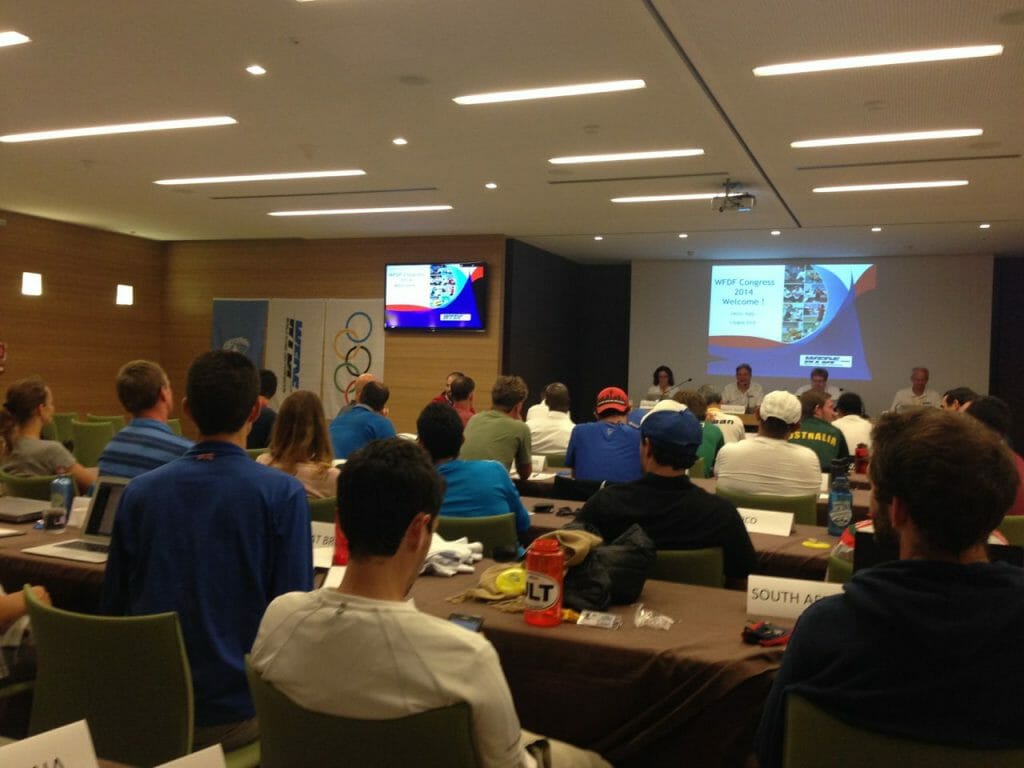WFDF held its annual meeting in Lecco right before the start of WUCC.
August 3, 2014 by Charlie Eisenhood in News with 3 comments

The World Flying Disc Federation held its annual Congress in Lecco on Friday morning to discuss issues ranging from game advisers and Spirit of the Game to annual budgets. With WUCC in town, this was one of the largest Congresses ever with representation from dozens of countries.
Here were some of the highlights of the annual meeting.
Olympics Closer Than Ever?
WFDF Executive Director Volker Bernardi spoke at length about the Olympic movement at the international level.
“The Olympic world is in a complete shakeup,” he said, referencing the radical changes being proposed to the Olympic program by new Interational Olympic Committee Director Thomas Bach.
The IOC has approved the Olympic Agenda 2020, which will begin to shift the way sports are selected for inclusion in the Olympics.
Bernardi said that if you asked him even two years ago when ultimate would be in the Olympics, he would have said, “I will not live for that day.”
Now? “The door to new sports is wide open.”
There is still a great deal of flux, and no one is quite sure what will happen. But there is increasing optimism that ultimate could reach the Olympics sometime within 20 years, if things go well. Bernardi emphasized the importance of participation in things like the Continental Games (Pan-American, Asian, e.g.) to increase the likelihood of reaching the Olympics.
“Things are flowing and we are doing what we can to increase our standing,” said Bernardi.
Game Advisers And New SOTG Considerations
Spirit of the Game taskforce leader Rueben Berg presented the findings of the subcommittee, which began its work in September 2013. Foremost among the task force’s recommendations was the creation of game advisers, new on-field rules experts that help players resolve calls and keep the game moving by communicating time limits.
They are not so far from being USA Ultimate-style observers, except that they have no power to make any calls. They can signal offsides, but the opposing team must choose to call it. They can provide perspective on what happened on a play if asked, but they cannot make a binding decision.
“Players maintain full responsibility for making and resolving all calls,” said Berg.
RELATED: WFDF Revises Officiation Policy, Adds Game Advisers For WUCC And Beyond
There was some pushback at the meeting from a number of federations, particularly Switzerland, about the game advisers being too involved as a third-party. There was a lot of resistance towards the idea of any move towards referees; the slippery slope argument seems present in many countries’ minds.
However, in many ways, this is just an extension of what WFDF has already had with rules experts on the sidelines. Now, they just involve themselves more clearly into the game.
“The game advisers play a much more active role in making sure the rules are followed,” said Berg.
But he was clear that the number one thing that will keep self-officiated play clean and fair is simple rules knowledge. If all players take the time to know the rules, there will be fewer conflicts, he explained.
“Education is really the key,” he said.
All countries present voted in favor of adopting the SOTG Commission’s recommendations, except for Switzerland and Belgium, which abstained.
NOTES
— WFDF is looking to centralize more of the tournament registration, payment processing, and paperwork associated with large international tournaments. They will work on implementing new systems over the next year.
— A number of countries complained about the high cost of WUCC, explaining that their small federations were unable to really absorb the large expense of the tournament. There was spirited discussion about the tradeoff between quality and price, and a lot of calls for more transparency in budgeting such tournaments.
— A funny moment during the introductions:
USA Ultimate Competition Director Will Deaver mentioned that USA Ultimate recently got recognition from the United States Olympic Committee.
The representative from Russia, Kate Barabanova, asked him when USAU got recognized.
“This year,” said Will.
“Oh, we got it last year,” said Kate, unintentionally one-upping him as laughter erupted.